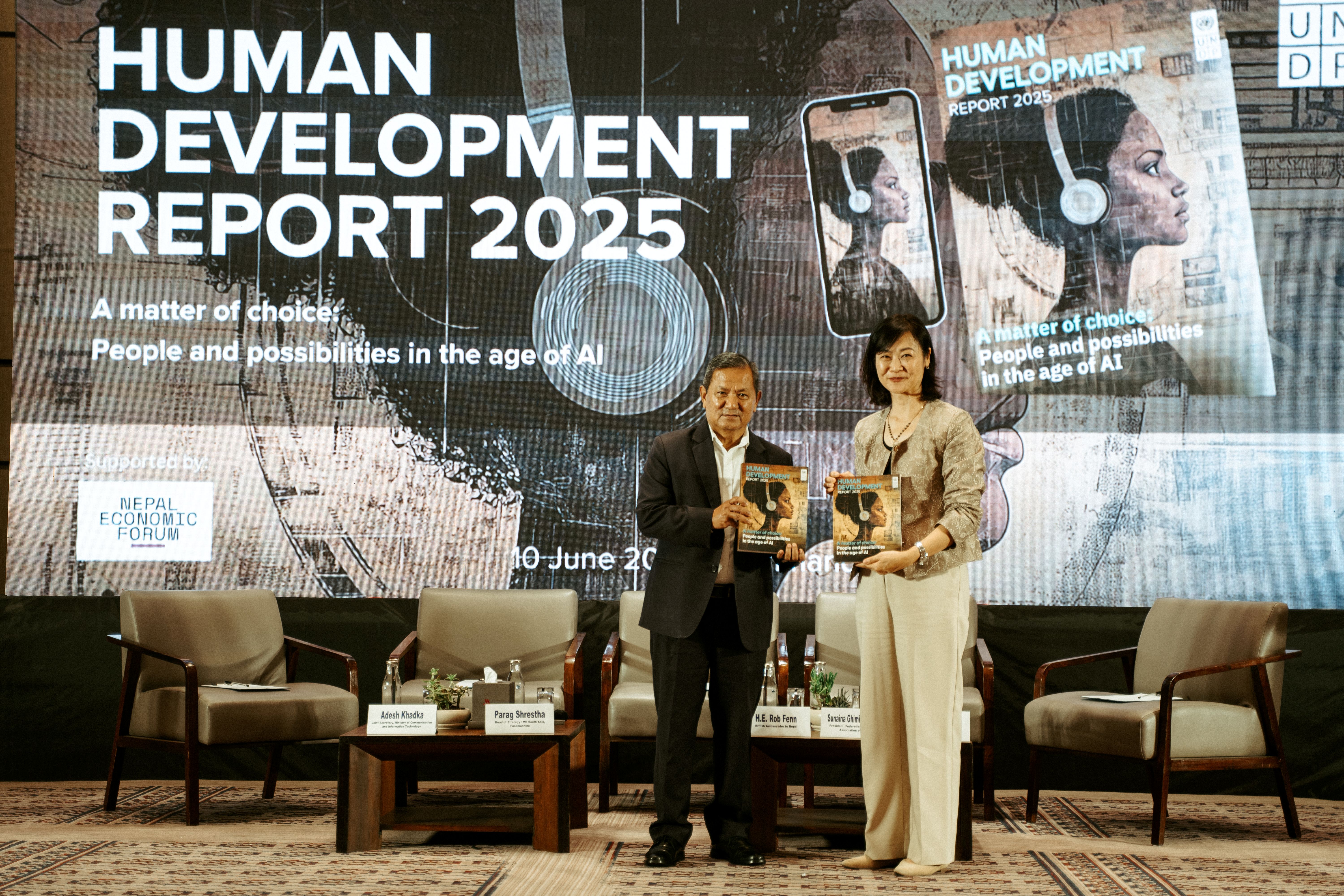KATHMANDU, June 11: The United Nations Development Programme (UNDP) launched its 2025 Human Development Report (HDR), "A Matter of Choice: People and Possibilities in the Age of Artificial Intelligence", at a special event in Kathmandu on Tuesday.
The event organised in partnership with the Nepal Economic Forum featured a high-level panel discussion on “Making AI Work for Nepal”. The session brought together a wide range of voices—from policymakers and academics to youth leaders, civil society representatives, and the private sector—to explore how AI can support inclusive and sustainable development.
The report jointly unveiled by Minister for Communication and Information Technology Prithivi Subba Gurung and UNDP Resident Representative in Nepal Kyoko Yokosuka paints a sobering picture: progress in global human development has stalled to its lowest level in 35 years, with widening disparities between rich and poor nations. Yet, amid the challenge, the report identifies artificial intelligence (AI) as a powerful force—one that must be thoughtfully governed to ensure it promotes equity, resilience, and opportunity for all.
At the launch, Minister Gurung noted that the country stands at a turning point, with AI rapidly transforming how people learn, work, and interact with the state. He shared that Nepal’s AI Vision aims to prioritise inclusion, empowerment, and people-centred growth over profit-driven or exclusionary models.
Bhutan Watch exposes deepening Human Rights crisis in Bhutan in...

UNDP’s Resident Representative in Nepal Kyoko Yokosuka said the report’s findings were a wake-up call, underscoring the urgency of harnessing AI not just for innovation, but to deepen human development and ensure no one is left behind.
UNDP Regional Innovation Advisor Alexandru Oprunenco highlighted that while Nepal has made steady human development gains—its Human Development Index (HDI) rising by 54% over the last 35 years—many challenges remain, including low income levels and persistent gender inequality. He stressed that AI must be developed in ways that enhance, rather than replace, human capability and help address real development issues.
The panel discussion, “Making AI Work for Nepal”, tackled key questions about how digital tools can drive inclusive growth, strengthen citizen-focused governance, and ensure fair access across all regions. Speakers emphasised the need for adaptive, learning-based governance to make the most of emerging technologies.
A senior official from the Ministry of Communication and Information Technology shared updates on national efforts to shape policies that leverage AI to benefit Nepali citizens. Nepal’s forthcoming National AI Policy, alongside the Digital Nepal 2.0 strategy, aims to integrate AI into sectors like agriculture, healthcare, and IT, creating new jobs and unlocking productivity.
Parag Shrestha of Fusemachines South Asia said Nepal has the talent, ambition, and infrastructure to build a globally competitive AI industry. With the right investment and trust-building between the public and private sectors, he said, AI can drive transformational change.
UK Ambassador to Nepal Rob Fenn cautioned that while AI holds immense promise, Nepal must guard against its early pitfalls. He highlighted the importance of digital literacy, public safeguards, and resilience against misinformation and social fragmentation as essential components of AI readiness.
Sunaina Ghimire Pandey, President of the Federation of Computer Association of Nepal, called for inclusive AI systems that are accessible and empowering—especially for women, students, and marginalised communities. She urged both government and the private sector to invest in awareness, infrastructure, and skills development.
Moderating the panel, Nepal Economic Forum Chair Sujeev Shakya brought a blend of global insight and personal reflection to the conversation, urging stakeholders to act decisively in shaping Nepal’s digital future.
In her closing remarks, MoCIT Secretary Radhika Aryal noted that while Nepal has made significant technological strides, the benefits are not equally shared. With the right approach, she said, AI can become a force for inclusive and equitable development.







































